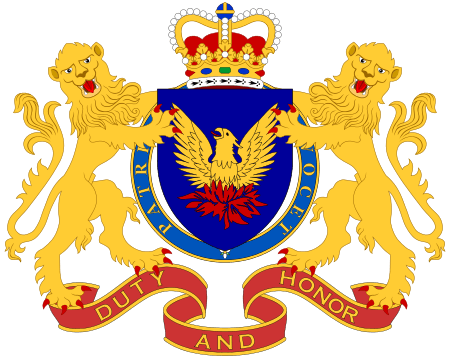History of Æfira
The Kingdom of Æfira was founded in 2007 by a small group of friends and colleagues with an interest in law and politics. The group decided to establish a country to serve as an experiment in British-style parliamentary governance, agreeing that the state would be a constitutional monarchy under the Westminster system of government and that its legal system would be modeled on English common law. By general consensus, the Crown was offered to King Maximilian, and on 6 June 2007 the Kingdom formally came into being as Parliament met for the first time.
With an initial population of six, the new state began to organize itself. The first public officers were appointed; ministerial departments were established; a judicial system took shape. Peerage titles were conferred on the founding citizens in recognition of their contributions to the endeavor. Quite early, in a major departure from the Westminster system, it was found necessary to abolish the House of Commons until such time as the country should grow larger. At this stage the Kingdom was still regarded more as a project or experiment than as a permanent polity, and governmental business was often conducted very informally. For its first few months the new country did not even have a name – official documents referred simply to “this most noble Realm”. The origin of the name “Æfira” is not recorded, but in December 2007 this was proposed for the country and officially adopted.
In early 2008, the House of Commons was restored and Æfira held its first general election. A proposal to abolish the monarchy gained little support, but – with the King then 17 years old and childless – Parliament enacted that the Crown should be elective rather than hereditary: the King’s successor would be chosen by the nation. The rapid pace of legislation continued, with Acts of Parliament defining criminal offenses, establishing a national bank and currency, expanding protections for human rights, and more. The limits of the state’s jurisdiction had been uncertain; now Æfiran law was declared to extend to any place where at least three citizens were present together.
Throughout this period, Æfira attained some publicity in its citizens’ social circles, and friends, relatives and associates of existing Æfirans sought to join the burgeoning community. In September 2008, a written Constitution was enacted, enshrining the basic structure of the state and the rights of the people as fundamental law. Public business gradually took on more formality, and Internet-based public records were introduced. The Kingdom established diplomatic relations with two similarly non-territorial states. Further symbols of nationhood were adopted, including a flag and a royal coat of arms.
By the second anniversary of the country’s founding, its population had tripled, and Æfirans gathered to celebrate the occasion with a ball at the Royal Court. But, as it became clear that not all citizens could continue to meet regularly in person, provision had to be made for carrying on official business by remote means. From this point, the pace of governmental activity and population growth slowed dramatically, but did not cease.
The Parliament of Æfira is thought to be the world’s first national legislature to meet and conduct business exclusively via the Internet. The volume of its post-2009 legislation cannot compare to that of its first years, but care for detail and technical skill have increased markedly. Between 2013 and 2016 a major program of statutory revision was carried out: drafting errors were corrected, obsolete Acts were repealed, and others were consolidated, amended or wholly rewritten. Æfiran law continues to develop in accordance with the country’s commitment to justice and equality. Marriage has been made open to all without regard to gender, the illegitimacy of children born out of wedlock has been abolished, and the right to vote is guaranteed to every citizen regardless of age.
With Æfiran citizens now dispersed across the globe, online facilities have been developed to enable them to vote, access public services and communicate with one another, wherever they may be. Opportunities for Æfirans to reunite in person have become rare, but intermittent gatherings – large and small, formal and informal – continue to be held. The ceremonial side of public affairs has not been neglected, with a series of honors instituted to symbolically recognize special merit. The Æfiran people now number 27, and the country is always ready to welcome new citizens to join the ongoing work of building a nation and a community.
 Kingdom of Æfira
Kingdom of Æfira
